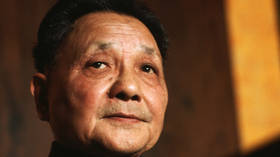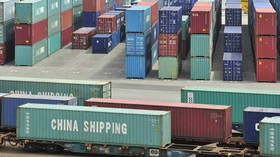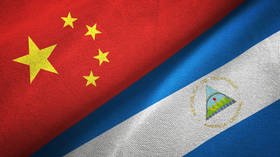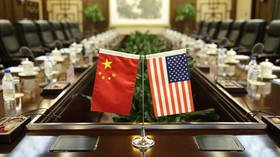How Nixon and Mao tried to bury the hatchet in 1972 and what happened to all that good will
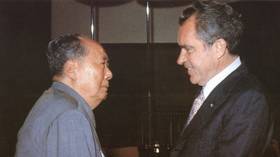
Richard Nixon’s visit to China in February 1972 changed the histories of America, China, and the world. But a single incident illustrates just how much pressure surrounded the mission, as the world’s most powerful man ended up tearfully apologizing to a younger member of his staff.
That was Chas W. Freeman Jr. part of the US delegation, in his role as Tricky Dicky’s chief interpreter. At the very last minute, Freeman was informed by the president’s appointment secretary that he was to interpret extemporaneously at a banquet.
“I had a good idea of what he was going to say, as I'd written much of the material for that. But he never sat down with me. The White House in those days was obsessed with secrecy,” Freeman told RT.com.
Eventually the text was presented, but Freeman was not impressed and told the secretary that he refused to translate.
“I said, ‘It might interest you to know that I did the draft of tonight's text and I know that some people at the NSC (National Security Council) have put in some of Chairman Mao's poetry, and if you think I'm going to get up in front of the entire world and ad-lib Chairman Mao's poetry from an unknown English translation back into Chinese you're out of’ – I used a foul word – ‘your mind’”, he explained.
“The president was not amused, but two days later, with tears in his eyes, he apologized to me for what he had done, so all was well, and we eventually did develop a decent relationship.”
This interplay also encapsulated a quirk of Nixon’s: that he didn’t use his own interpreters at meetings.
“It was a very bad practice that President Nixon had of using the other side's interpreter, rather than his own. His concern was you gentlemen of the press might have access to an American interpreter and squeeze something out of us you couldn't from the Chinese; he did the same thing with the Russians.”
The era-defining meeting between Nixon and Chairman Mao is cloaked in mystery, as no one on the US side could speak Chinese. This, coupled with the terrible state of the Chinese leader’s health, has caused much speculation about what he really said.
Freeman, 78, revealed, “He was essentially on life support, he was very ill and on oxygen; they had to wait for a moment when he was alert and able to conduct a meeting. This came on the afternoon suddenly on the day that Nixon arrived. Nixon went off to the meeting with no one from the Department of State; there was no one in the room on the American side who spoke Chinese. So, Chairman Mao might have been reciting ‘Alice in Wonderland’ for all we know; the interpreters may have been putting words in his mouth. But I don't think so, I don't think anyone in China would dare do that.”
Reflecting on his boss' choice of sidelining him from that meeting, “In our elected monarchy, the king gets to decide. He was, essentially, paranoid. He was a great statesman, but he had a defective character which eventually did him in.”
That “defective character” reached its nadir in 1974 with the Watergate scandal that eventually forced Nixon to resign, but the significance of what took place two years earlier cannot be understated.
The US was China’s biggest enemy, and they had no diplomatic relations. What made this historic thawing of the relationship even more unexpected was that, ironically, Nixon was the world’s foremost anti-communist.
“We went to meet with what we had previously called the 'bogus regime' in Beijing. This is very, very unusual. It's hard to find an example in history of this kind of maneuver. It did indeed change the world. It's human nature to be nervous when you meet someone you haven't met before, who's been an enemy for 23 years, so of course there was apprehension,” said Freeman, who went on to have a glittering career as American ambassador to Saudi Arabia and assistant secretary of defense for international security affairs under Bill Clinton.
America had backed the Kuomintang against the Chinese Communist Party in China’s civil war, also known as the War of Liberation, but by 1972, they had to face the reality that the Communists had won and controlled the country, so Nixon opted to extend the hand of friendship.
The summit was split into two; the leaders spoke about what they agreed on and the foreign ministers about what they didn’t. Freeman was a key part of the latter.
“I largely got to explain to China why the war in Vietnam was just and would end in our success, why our opposition to North Korea was principled and purposeful, and why our objection to Indian occupation of Kashmir was proper and so forth. The secretary of state who was put in the position of arguing these cases was a lawyer, a former attorney general, and a crony of Mr. Nixon, and not an expert in foreign policy, which is one of the reasons Henry Kissinger was able to be so influential.”
However, Freeman had a job to do and relayed every word to the Chinese, even if one conversation still causes his toes to curl with embarrassment.
“The Chinese acting foreign minister was a former vet and specialist in mules; he had been on the long march with Mao and the American secretary of state was a great golfer, so he told all sort of stories about golf and about his collection of Sam Snead's hats, Sam Snead being a famous golfer. Of course, the Chinese acting foreign minister didn't know what golf was and knew nothing about Sam Snead, so off I went even as I cringed inside,” Freeman recalled. “You must be the faithful echo of the people you are interpreting for; even if they say foolish things, you try to deliver it straight.”
At the culmination of the weeklong visit, the Shanghai Communiqué was signed by Nixon and China’s premier, Zhou Enlai.
“He recognized, as we did, that we each had friends and allies we had to reassure, that we were not betraying and not negotiating behind their backs. The Shanghai Communiqué is very unusual in diplomatic history, because it begins with page after page of recitations by both sides of the extent that we absolutely do not agree with each other. Usually, this kind of thing is papered over in diplomatic documents; this time it wasn’t,” said Freeman.
It was with some pride that the American party got back aboard Air Force One to fly home, as the watching world digested what had been achieved.
Describing the mood as “ebullient” Freeman added, “We had accomplished what we wanted to accomplish diplomatically. It was becoming apparent to the domestic political spin-doctors that this had gone extremely well domestically; the television had introduced Americans to something of the reality of China and portrayed the Chinese in human terms. We always tended to demonize our adversaries in the 1950s. The Chinese, because they all wore blue boiler suits, they were characterized as ‘the blue ants’, some sort of non-human collective insectoid population. I think people had their eyes opened. Here was a country very different from ours but worth examining on its own merits.”
In China, there was also a softening of feelings. Carl Zha was born in 1976, a month after Mao died, and began life in the shadow of the historic summit.
He currently presents the ‘Silk and Steel’ podcast on Chinese culture, “When I grew up in 1980s China, there was a tremendous amount of goodwill on the part of Chinese people toward the US. Inside China not much had changed from 1972 to 1976. The real shift happened after Mao's death and Deng Xiaoping's rise to power. It was PRC collective leadership under Deng that made the decision to open China to foreign exchange and investment, etc.”
This is a point when the two axes spin in different directions. Did America allow or grant China the chance to prosper, or was it Chinese decisions that allowed them to become the economic superpower they are today? Zha said, “The language of ‘giving or allowing’ speaks more about the Anglo media than the reality.”
This conflation of perception is echoed by Professor Kenneth Hammond, New Mexico State University’s resident China expert. “It encouraged American elites to believe that their hopes for a change of system in China were coming true,” he said. “But this was an illusion. China never intended to submit to American hegemony.”
This divergence has continued and brings us to where the world stands today.
Chinese and US relations are not good as both battle for supremacy, and Taiwan is the poker chip that represents the tussle between the world’s two most powerful nations.
“Perhaps most importantly, as delineated in the Shanghai Communiqué, China was able to get the Americans to acknowledge that Taiwan is a part of China, and that the question of the status of Taiwan was a matter to be settled by the Chinese people on both sides of the Strait, in their own way and in their own time. The US pledged to reduce its military aid to Taiwan, and to respect the sovereignty and territorial integrity of the People’s Republic,” Hammond explained.
Nothing stays frozen in time and, along with Donald Trump’s aggressive trade policies with China, disruption has been caused by American attitudes to Taiwan changing over the years.
In Washington, it has become a democracy to protect, and political capital is staked on Taiwan; this is very different from the 1972 agreement. “We have over the course of four decades done a lot of salami slicing, and there really is nothing left of the sausage at this point,” said Freeman. “From the Chinese perspective, the United States has gone back on its word. From the American point of view, the issue has become one of ideological sympathy for self-determination, and this is the basis of the current conundrum which, if it is not addressed, is likely to result in military conflict.”
That is a grave fear for the entire world. If there is a miscommunication or an errant act of aggression, war could break out. It goes without saying that both are nuclear powers and have enough military hardware to wreak torrents of destruction, placing millions of lives in peril.
Freeman, who has held roles during periods of US conflict, is steadfast in his opinion that any such action must be avoided.
“If this is treated as a military issue, it will very likely end in tragedy,” he said. “If it's treated as a political issue or a diplomatic issue, we can find ways to compromise. I think the Chinese can be very flexible in terms of securing a status for Taiwan that is acceptable for people in Taiwan, but that requires talks, and those talks have to be based on the principle of One China, meaning they have to be about reunification and an agreed relationship between Taiwan and the mainland of China. They can't be based on the idea that they will produce Taiwan separatism. At the moment there are no talks; if there are no talks, it's very hard to imagine diplomacy.”
This leaves Joe Biden in a difficult position. He must somehow bridge the 1972 agreement with the current political climate in the US, whilst he has no majority in either the House or the Senate to support his plans.
Secretary of State Antony Blinken is on a trip to the Pacific to reassure allies about the continued US pushback against China, and American officials also boycotted the Winter Olympics in Beijing. This has all put the current White House tenant between a rock and a hard place.
However, Hammond is less sympathetic, “When President Biden spoke with President Xi last fall, he reaffirmed America’s support of the One China Policy. But the actions of the Biden administration have moved in exactly the opposite direction, ramping up an atmosphere of tension over Taiwan and fostering feelings of fear and hatred towards China among the American people. This is irresponsible and foolish.”
While Xi has no power struggle to contend with in Beijing, he has a tricky situation over how the Chinese are perceived in America, and there is a festering annoyance over belittlement.
“Chinese people do make a distinction between the US government and the American people. Americans, for the most part, still receive friendly receptions in China, but that's not the case in the US,” explained Zha. “US media have reverted back to Yellow Peril and Cold War Propaganda when it comes to China. China and Chinese people have been blamed for the Covid pandemic. We are seeing the consequences of that in the US when people of East Asian appearance are physically attacked. Even US Olympic gymnastSunisa Lee, who is a Hmong American, was subjected to a racist attack.”
The standoff has become the ultimate game of poker. It began in 1972 and is now approaching a climax 50 years later. Both sides have cards to play but are wary of what the other will throw down in response. The experts want inspiration to be taken from Richard Nixon and Zhou Enlai’s historic summit and for any grandstanding to be avoided.
Hammond said: “The anniversary of the Shanghai Communiqué should be a moment of recommitment to a world of cooperation and collaboration between the American and Chinese people in the quest for a prosperous sustainable future for the world. People of good heart should call on political leaders to honor the terms of the Communiqué and return to a path of peace and friendship."
There is one final caveat that a career diplomat and well-travelled wanderer of the corridors of power like Freeman knows only too well – one he learned from the man who apologized to him in tears.
“President Nixon at one point said something important contradicting Churchill, who said it's always ‘better to jaw-jaw than war-war,’ and he said, ‘It's not always better to talk to someone than not to talk to them, it depends on if you know what you're going to say.’ We (America) don't know what we would say at this point, so what we need is a strategy for reducing the danger of war and promoting the possibility of peace. At the moment, there is no strategy and very little prospect one will emerge.”
